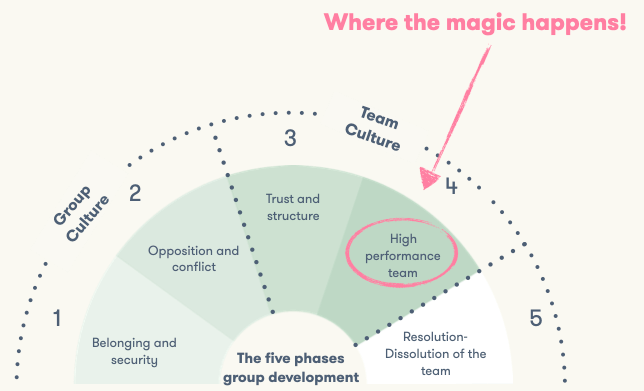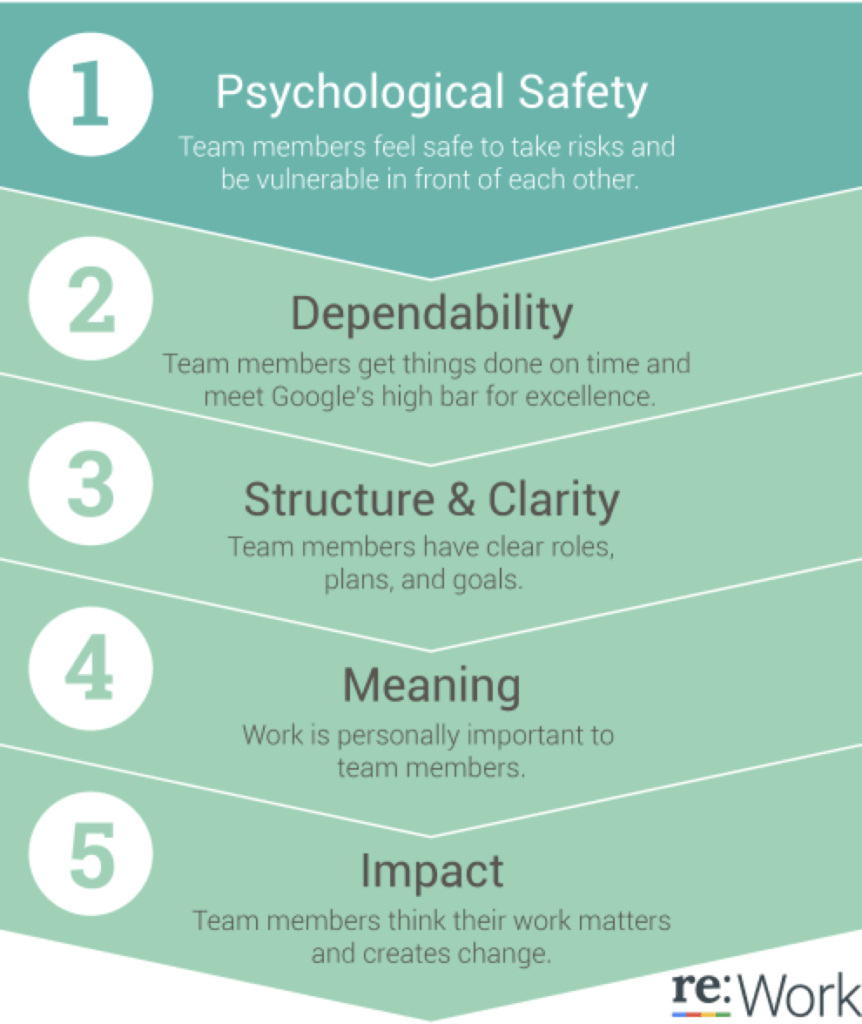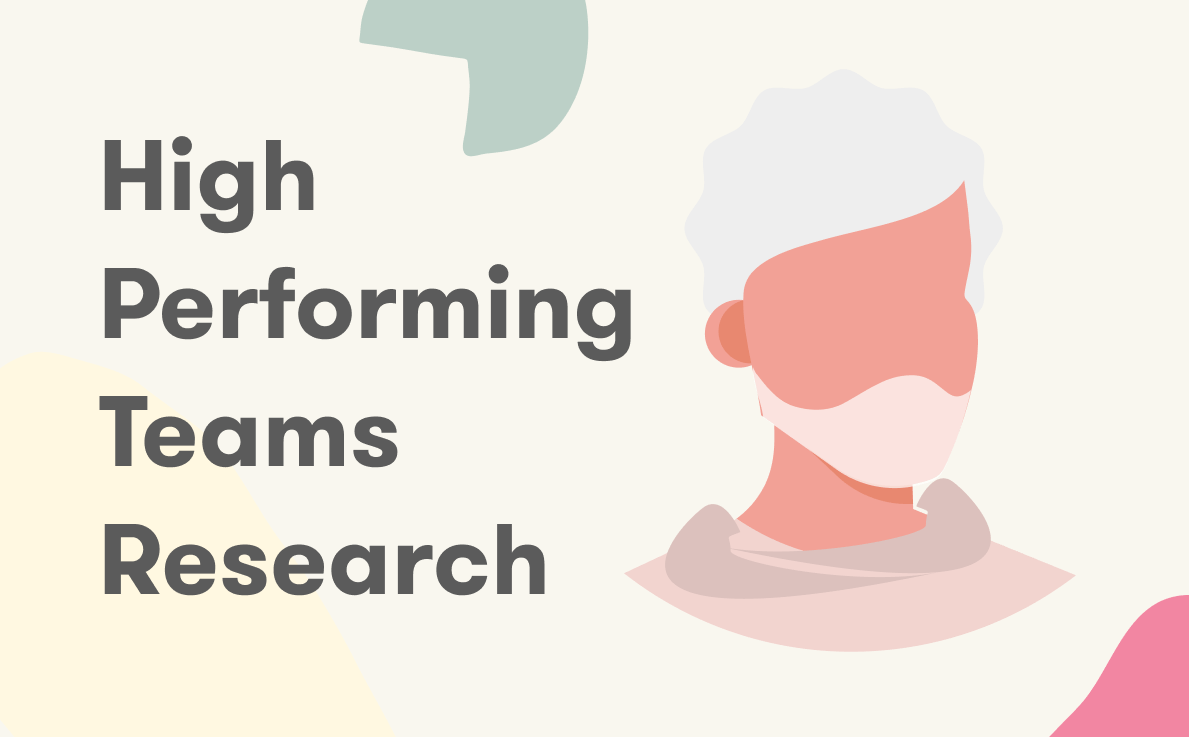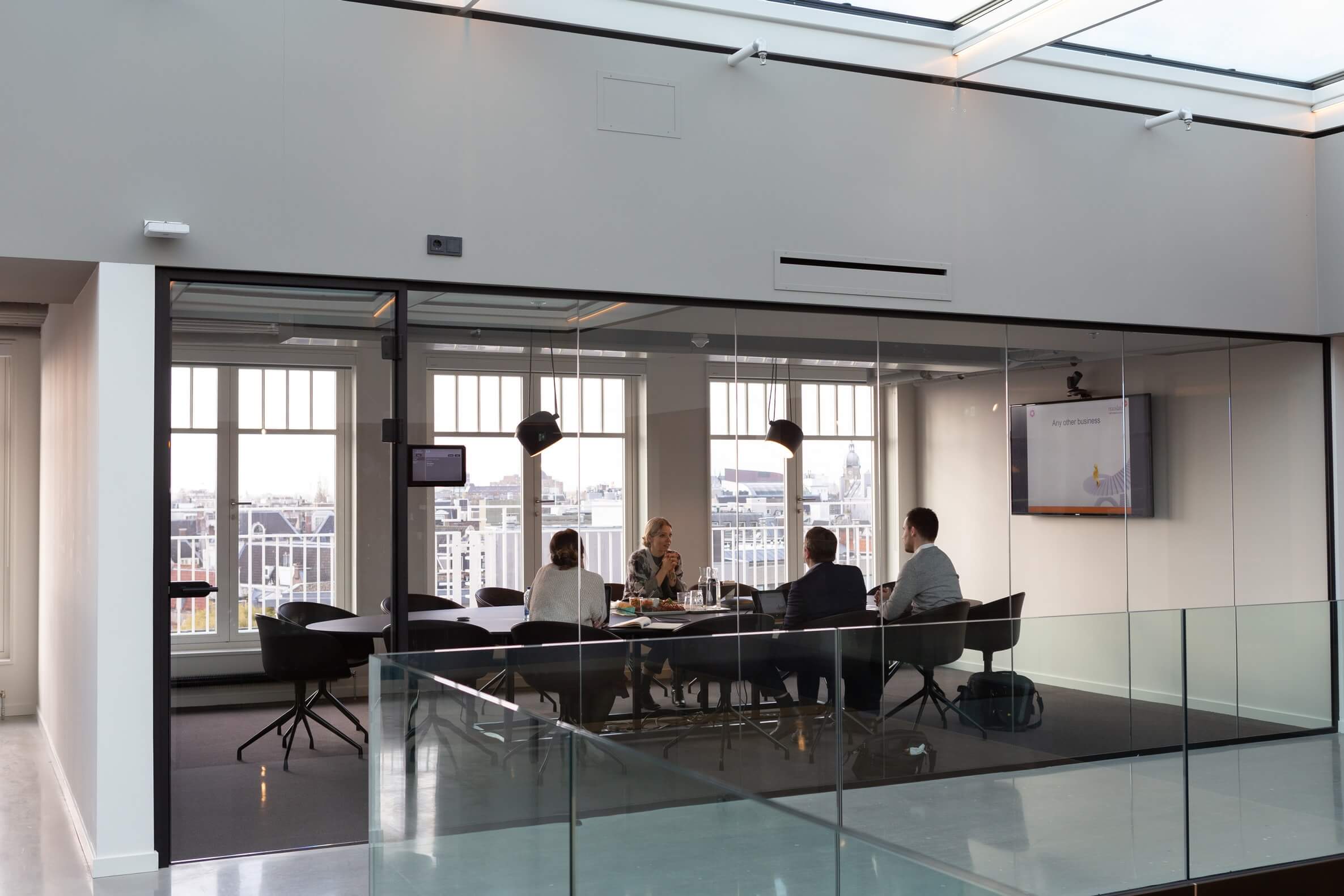Susan Wheelan has studied the development of working groups for 30 years.
Susan Wheelan, professor of psychology and authority in the field of group dynamics and group development, states in her book (Creating effective teams) that 70-80% of all teams never achieve high efficiency due to too much focus on the "How" in meetings, workshops, and the daily work. She also emphasizes that with the right conditions, all different types of groups can get there.
Wheelan summarizes current research in his model in the subject of group development, with a model that includes five stages. The four stages address the group's development and the fifth stage deals with the group's dissolution.

1. Belonging and security
- The members show the need to be confirmed and accepted. They get to know each other.
- They explore the group's goals, values, and rules.
- They respect the leadership.
- All team members are included in the process.
2. Opposition and conflict
- The group needs to jointly arrive at goals and routines. As part of this, conflicts arise over tasks and values.
- Smaller groupings within the group are created. Dissatisfaction arises and the members challenge each other to a greater degree.
- Leadership is changing.
3. Trust and structure
- Increased willingness to cooperate and stronger relationships among the members.
- Great understanding of how to deal with conflicts within the group.
- Roles, power, and influence are no longer as important.
- The members are more solution-oriented and more open to other alternatives.
4. High-performing team
- Roles, responsibilities, and tasks are clear to everyone.
- Tasks are solved together as a team.
- Members feel secure in expressing their views.
- The energy is put entirely into the work.
- Everyone takes responsibility for the result.
- The communication is clear. 5. Dissolution of the team
5. Dissolution of the team
Over time, all teams change so that it is no longer the same. Members leave and are replaced by new members or the team changes for other reasons e.g. a reorganization.
What neuroscience says about collaboration and creating high-performing teams
Neuroscience offers a surprisingly new understanding of what creates and destroys high-performing teams. It turns out that high-performing teams differ neurologically from mediocre and bad teams. When we are part of a really good team, it feels special, even if we can not put our finger on what it is. Studies of how the brain works provide convincing evidence of how inclusion, trust, and purpose affect teams and how you can create the conditions for real cooperation and success as a team.
Psychological safety
In pressured environments, teams will never be effective because team members will then largely think with their reptile or survival brains and not have access to the higher thinking ability that collaboration and innovation require. The biggest aspect of security in today's workplaces is psychological security. Dr. Amy Edmondson, a professor at Harvard Business School who studies effective teams, has found that psychological security is what sets the most high-performing teams apart from the rest, regardless of the industry in which they work.
Proper team building
Teams must be given the opportunity to learn how to become a good team. They need to understand collaboration, group development, different work styles, effective communication, how to have difficult conversations, project management, and how to create psychological security. This can be achieved through team building where team members get to know each other on a deeper level and build real trust in each other, which is a prerequisite for cooperation.
Leaders with collaborative intelligence
Organizations must select and develop team leaders with the ability to create an environment where others can collaborate. This type of team leader is a facilitator who helps others develop trust, engage with respect, resolve conflicts, and wrestle with the often challenging work of creativity and innovation. This ability can be called collaborative intelligence and is described i.a. in the book "Collaborative Intelligence: Thinking with People Who Think Different" by Dr. Dawna Markova and Angie McArthur.
Conflict management
Conflict is an inevitable part of group development and cooperation. All teams should have developed an agreed process for dealing with situations before problems arise. It is common for employees to turn to the manager with complaints, but in high-performing teams, team members can resolve their conflicts themselves using a respectful process to deal with friction and disagreements. This strengthens the team.
Google wanted to investigate what creates effective teams?

To do this, a study was conducted under the name Project Aristotle. The study included over 200 interviews with over 180 Google teams based on the hypothesis that effective teams are created by finding the perfect mix of high-performing individuals with different skills.
Their hypothesis fell flat after they came to the conclusion that it does not matter which individuals the team consists of. What matters is how safe the team members feel, how they collaborate, how they structure their work, and how they solve problems together.
The project was named after Aristotle, who coined the expression "The whole is greater than the sum of its parts"
Five factors differentiate successful teams from other teams on Google
1. Psychological security
- The team feels that they can prove vulnerable without feeling insecure or embarrassed. They feel that they are treated with respect and trust.
2. Reliability
- The team members feel that they can trust each other, that they deliver what they promise on time, and communicate honestly about how they are doing.
3. Structure and clarity
- Roles, plans, and goals need to be clearly defined for the entire team.
4. Meaningfulness
- Every team member needs to feel that they are working on something meaningful.
5. Imprint
- The team members should feel that their work contributes to something bigger, that they make a difference and create change.

Conclusion
Investing in building our team matters a lot to really building your teams. We can’t just talk about the characteristics of high-performing teams on Monday and believe we will be high-performing the next day. Aside from the time, energy, purpose and It takes a whole lot of nudges to start embracing the fundamentals of a high-performing team.
If we look at Google's study, Susan Wheelan's extensive research in group development, and the research from neuroscience we can conclude that building really great teams start from finding a safe place for the team to express themself, so they aren’t punished for speaking out, taking risks or being vulnerable in front of each other.
But it’s not enough just feeling safe, the team also needs to be aligned, have clear and transparent goals with a higher purpose to motivate and steer the team to delivering results continuously. These are more structural things that can be up-skilled and formed over time with mindsets and tools that build alignment and purpose.
At WilburFlow we work with micro learnings, and team reflection over time to repeat and nudge the team to a safe space, infusing different mindsets to embrace change as well as tools to start the team's collaboration, alignment, and direction. It takes time, but it's worth it, and it's something you should start as soon as possible when you start building your team.

Yeah, and don´t forget to smile, it looks good on you!
/ Joacim Alm
Founder of WilburFlow

